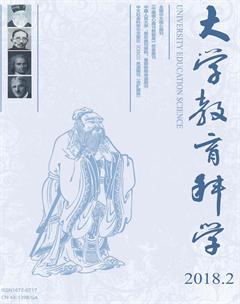From advanced knowledge to university curriculum: An Academic Generation Process
LIXiao-ying
Abstract: The generation process of university curriculum is not only a process of exploration, discovery, judgment and selection, but also a specialization, logical, systematic and stereoscopic process of advanced knowledge. These processes are full of academic.
The generation process of university curriculum is the process of exploration, discovery, judgment and selection of advanced knowledge. University curriculum originates from people's discovery and accumulation of advanced knowledge, from exploration and revelation of one unknown field after another, from people's judgment and choice of advanced knowledge, from people's orderly arrangement of advanced knowledge. University curriculum is the "organic integration" of advanced knowledge. The profoundness of knowledge is the most essential characteristic of university curriculum. Without advanced knowledge, the university curriculum does not become a university curriculum, the so-called university curriculum must not be a real university curriculum.
The generation process of university curriculum is a specialized process of advanced knowledge.
University curriculum is a collection of specialized knowledge, the sort of “hodgepodge” or “simple platter” of advanced knowledge are not enough to become a university curriculum, it is also not suitable for high-level professional or specialized education. The specialization of advanced knowledge is not only a process of differentiation of advanced knowledge, but also a process of integration of advanced knowledge.
Differentiation and integration of advanced knowledge are the ecological mechanisms of the generation of university curriculum; they are also the permanent source of “changing with each passing day and day” in university curriculum, and an inexhaustible motive force for the diversity and vitality of university curriculum.
The generation process of university curriculum is the logical process of advanced knowledge. University curriculum is a knowledge system composed of various knowledge units and theoretical modules with internal logical relations, which is a combination of rule, structure and order.
University curriculum arrangement or knowledge combination, on the one hand, should comply with high-level specialized talents knowledge structure, ability structure and quality structure of the inner requirement; on the other hand, it also should follow certain rules of learning and teaching.
The generation process of university curriculum is a systematic process of advanced knowledge. The secret of the university curriculum lies in the structure of knowledge. The generative process of university curriculum is a structural process of advanced knowledge, which is also included in a deep systematic process. University curriculum is based on a high level of knowledge and is connected to a system according to some logic and proportion. There are various “lever details” between different knowledge and knowledge, between knowledge unit and knowledge unit, between knowledge plate and knowledge plate, it is not a simple superposition or a big platter of the advanced knowledge. The advanced knowledge, which is generated by inherent logic and the proportional relationship of advanced knowledge is the law that university course management must stick to; it is also the cornerstone of realizing “the emergence of the whole function” of different advanced knowledge.
The generation process of university curriculum is the stereoscopic process of the advanced knowledge. In present age, differentiation, synthesis, cross, penetration, fusion and integration of advanced knowledge are intertwined or coexist, a flat university curriculum design pattern is outdated, we must reconstruct or construct a stereoscopic university curriculum with a new kind of thinking logic in order to conform to the new advanced knowledge production mode. University curriculum or stereoscopic advanced knowledge means that teachers are not a preachers, students are not passive recipients of knowledge, teaching material is not the only learning contents, classroom is not the only learning place. The correct answer needs to be found in reverse thinking and multi-dimensional view.
Key words: advanced knowledge; university curriculum; generation process; Academic

